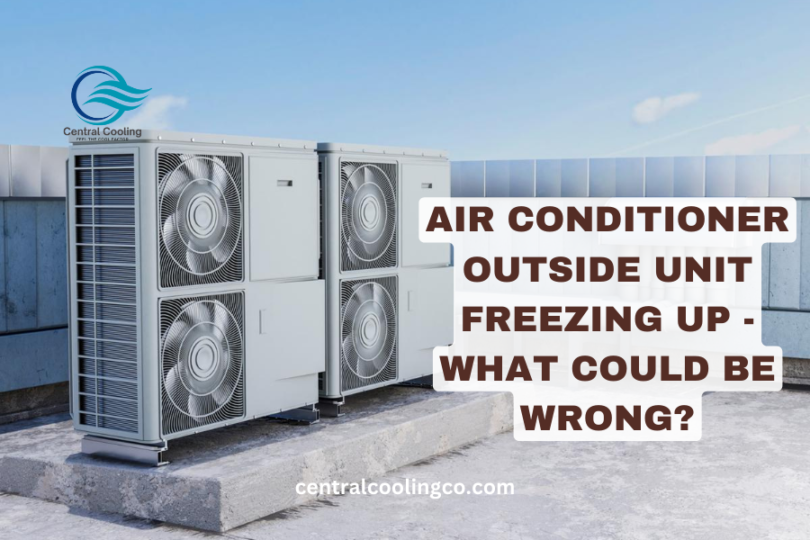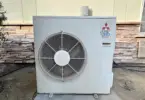Over time, an HVAC system might break down for a variety of reasons. Air conditioning problems can be brought on by structural damage, worn parts and components, and the like. Air conditioner outside unit freezing, however, are a common issue.
You might be wondering what’s causing your air conditioner outside unit freezing up when it’s so hot inside.
There are a number of potential causes of frozen outside units, including a lack of refrigerant, an obstruction in the drainage system, freezing weather, or a malfunctioning thermostat.
This article will discuss the causes of coldness, and how to treat it. So, keep on reading.
Why Does The Air Conditioner Outdoor Unit Freeze Up?
There are a number of possible explanations for this:
- Compressor gas escapes
- Impediment to Drainage
- The Ambient Temperature Shifts Filter clogged due to dust buildup
- Damaged thermostat
Ice accumulation prevents the air conditioner from functioning properly, putting unnecessary stress on the compressor. When ice builds up in the air conditioner and fails to cool effectively, it strains the compressor. This stress can weaken the compressor (expensive repair) and, wear out other internal components over time.
Over time, this strain can wear down other internal components and compromise the compressor (at a high cost to replace). When the weather starts to warm up in the spring, it can be a hassle to deal with broken air conditioners.
Reasons Why Outdoor Air Conditioning Units Freeze Up
Let’s take a look at what causes air conditioners to freeze up.
Refrigerant (or “coolant”) Escapes:
Air conditioner refrigerant is to blame for the fluctuating pressure and temperature. If there is a leak in the evaporator coil, the entire system may freeze up. Freezing of the refrigerant tube or, U-bend perforations in the condenser coil can also cause leaks. Your air conditioner’s leak has to be fixed and refilled if you keep putting new refrigerant to it and it keeps freezing up.
Also, Check out: AC Unit Freezing Up In The Summer – What Could Be Wrong?
Stoppage of Drainage:
If sufficient drainage is not provided, the condensate from the HVAC system will become trapped and eventually freeze due to the cooling process. The main purpose of the drain is to lead water away from the coil and into the drain. If the coil freezes, ice will form on it and the system will shut down, causing expensive damage.
Variations in Ambient Temperature:
Cooling efficiency drops significantly below 60 degrees Fahrenheit, the minimum operating temperature for most air conditioners. During the colder months or in certain locations, the temperature at night may drop too low for the air conditioner to perform properly. Icing forms on the inside of an air conditioner when the outside air is too cold. Turn off your air conditioner and let it thaw if it freezes up.
Accumulation of Dirt Causes Filter Clogging:
A clogged air filter is a typical culprit in HVAC systems breaking down. When dust and grime build up on the filter, it restricts airflow and places additional strain on the machine. Let’s pretend the air conditioner’s vents are blocked. If there isn’t enough heat coming from somewhere else, the evaporator coil could freeze. This could be fixed by cleaning, repairing, or replacing the air filter.
Broken Thermostat:
Problems with the thermostat or the heating and cooling system as a whole can also cause freezing conditions. The air conditioner could keep running even if it’s not hot outside if the thermostat stops working. The air conditioner’s condenser coil could freeze if operation is continued, rendering the device inoperable.
Troubleshoot:
Thermostats can be recalibrated or replaced if they stop working properly. Don’t try to fix the freezer’s AC on your own. Preventive measures can be taken, and in some circumstances the root cause of the freeze can be identified. Saving money on diagnostic fees when seeing an HVAC expert is possible with some basic troubleshooting knowledge.
Power Down The Air Conditioner:
If there is frost on the air conditioner or ventilation is obstructed, you should turn off the system. If the a/c unit’s evaporator coil has iced over, blowing warm air over it will help it thaw.
Checking The Screen:
irflow over the coil is diminished when the filter is unclean, as was previously mentioned. Reduced airflow causes the coolant temperature to fall below the minimum necessary, leading to rapid frost formation. If the filter seems to be blocked and the system freezes, turn it off, change it, wait at least 24 hours, and then try again.
You may find it helpful: How Much Clearance Must Be Left Around Outdoor Unit?
Check The Drain Line Of The Evaporator Coil:
The condensation that the air conditioner collects from the air freezes if the drain pipe is obstructed. If there is a blockage in the drain line leading to the evaporator coil, water will begin to accumulate in the drain pan. Keep in mind that this may lead to flooding in your house.
Open And Clean All Vents:
The same effect as the filter freezing due to dirt buildup can be achieved by closing the supply air vents: less air blowing into the room register. Make sure that the vents are clear of any obstructions.
In what Timeframe Does The A.C Coil Begin To Melt?
he evaporator coil defrosting process could take up to a day. You may be able to unzip the AC unit by yourself in many instances. If the evaporator coil is frozen, the air conditioner shouldn’t be turned on. The compressor is struggling and may break. Find the electrical fuse box and flip the AC unit’s power switch to the off position to begin defrosting the coils.
If you want to avoid damaging your equipment, don’t try to remove the ice by hand. When the coil and condenser have melted, the water that has gathered around the unit can be drained.
Check The Reason And Solve It To Avoid Freezing Up Problems!
There are a number of potential causes for your air conditioner to freeze up and stop working. Fixing the issue on your own is perfectly OK. However, a professional HVAC technician should always be consulted to ensure the quickest and safest startup of the unit.
FAQs
Can I unfreeze my air conditioner by pouring hot water on it?
To put it simply, “Yes.” Your air conditioner will defrost faster if you pour hot water on the ice. It is not required to use really hot water to defrost the ice; even warm water or running water will do the trick.
If the air conditioner defrosts, will it automatically melt the ice?
In the absence of functioning coils, the ice should melt. Depending on how well insulated your unit is, it could take more than 24 hours for the ice to melt.
When left outside, how long does it take for an AC unit to defrost?
Defrosting an air conditioner might take anything from two to twenty-four hours. This is heavily influenced by factors including the AC unit’s size, the surrounding temperature, and the current ice accumulation.
How does one go about defrosting an outside unit?
- Turn off the air conditioner’s thermostat first.
- Next, you need to flip the fan’s setting from “auto” to “on.”
- The fan will help the system gradually defrost.
- Once the ice has been removed (which could take an hour or more), you can turn on your air conditioner again and have the fan run automatically.
For what reason would an exterior unit freeze up?
The primary cause of HVAC freezing is a filthy air filter. The air filter helps maintain healthy air quality in your home. As your air conditioner operates during the summer, it collects debris, pollen, dust, and other allergens in the filter. If ventilation is impeded, the HVAC coils could freeze.
If an air conditioner outside unit freezing, what should I do?
In order for the air conditioner to thaw, it must be switched off first. After it has thawed enough, which usually takes between one and three hours, turn on the fan for one hour. The moment has come to change the filter in your air conditioner.
Disclosure: We may get commissions for purchases made through links in this post.








